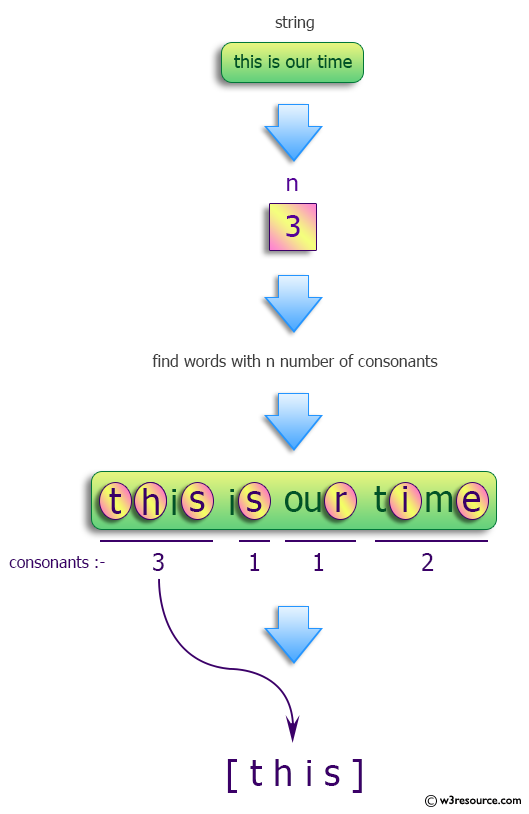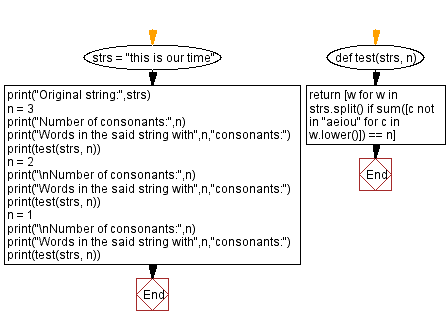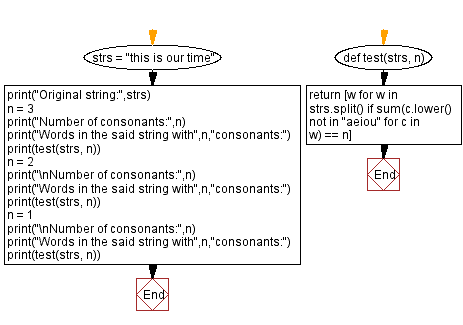Python: Find all words in a given string with n consonants
Words with N Consonants
From vocabulary.com:
A consonant is a speech sound that is not a vowel. It also refers to letters of the alphabet that represent those sounds: Z, B, T, G, and H are all consonants. Consonants are all the non-vowel sounds, or their corresponding letters: A, E, I, O, U and sometimes Y are not consonants.
Write a Python program to find all words in a given string with n consonants.
Input: this is our time Output: Number of consonants: 3 Words in the said string with 3 consonants: ['this'] Number of consonants: 2 Words in the said string with 2 consonants: ['time'] Number of consonants: 1 Words in the said string with 1 consonants: ['is', 'our']
Visual Presentation:

Sample Solution-1:
Python Code:
# License: https://bit.ly/3oLErEI
# Define a function named 'test' that takes a string 'strs' and an integer 'n' as inputs
def test(strs, n):
# List comprehension to filter words from the input string based on the number of consonants
return [w for w in strs.split() if sum([c not in "aeiou" for c in w.lower()]) == n]
# Assign a specific string 'strs' to the variable
strs = "this is our time"
# Print a message indicating the original string
print("Original string:", strs)
# Assign a specific value 'n' to the variable
n = 3
# Print a message indicating the number of consonants to be checked
print("Number of consonants:", n)
# Print a message indicating the operation to be performed
print("Words in the said string with", n, "consonants:")
# Print the result of the test function applied to 'strs' and 'n'
print(test(strs, n))
# Assign another specific value 'n' to the variable
n = 2
# Print a message indicating the number of consonants to be checked
print("\nNumber of consonants:", n)
# Print a message indicating the operation to be performed
print("Words in the said string with", n, "consonants:")
# Print the result of the test function applied to 'strs' and 'n'
print(test(strs, n))
# Assign another specific value 'n' to the variable
n = 1
# Print a message indicating the number of consonants to be checked
print("\nNumber of consonants:", n)
# Print a message indicating the operation to be performed
print("Words in the said string with", n, "consonants:")
# Print the result of the test function applied to 'strs' and 'n'
print(test(strs, n))
Sample Output:
Original string: this is our time Number of consonants: 3 Words in the said string with 3 consonants: ['this'] Number of consonants: 2 Words in the said string with 2 consonants: ['time'] Number of consonants: 1 Words in the said string with 1 consonants: ['is', 'our']
Flowchart:

Sample Solution-2:
Python Code:
# Define a function named 'test' that takes a string 'strs' and an integer 'n' as inputs
def test(strs, n):
# List comprehension to filter words from the input string based on the number of consonants
return [w for w in strs.split() if sum(c.lower() not in "aeiou" for c in w) == n]
# Assign a specific string 'strs' to the variable
strs = "this is our time"
# Print a message indicating the original string
print("Original string:", strs)
# Assign a specific value 'n' to the variable
n = 3
# Print a message indicating the number of consonants to be checked
print("Number of consonants:", n)
# Print a message indicating the operation to be performed
print("Words in the said string with", n, "consonants:")
# Print the result of the test function applied to 'strs' and 'n'
print(test(strs, n))
# Assign another specific value 'n' to the variable
n = 2
# Print a message indicating the number of consonants to be checked
print("\nNumber of consonants:", n)
# Print a message indicating the operation to be performed
print("Words in the said string with", n, "consonants:")
# Print the result of the test function applied to 'strs' and 'n'
print(test(strs, n))
# Assign another specific value 'n' to the variable
n = 1
# Print a message indicating the number of consonants to be checked
print("\nNumber of consonants:", n)
# Print a message indicating the operation to be performed
print("Words in the said string with", n, "consonants:")
# Print the result of the test function applied to 'strs' and 'n'
print(test(strs, n))
Sample Output:
Original string: this is our time Number of consonants: 3 Words in the said string with 3 consonants: ['this'] Number of consonants: 2 Words in the said string with 2 consonants: ['time'] Number of consonants: 1 Words in the said string with 1 consonants: ['is', 'our']
Flowchart:

For more Practice: Solve these Related Problems:
- Write a Python program to find all words in a string that contain exactly n consonants.
- Write a Python program to iterate over a list of words and count consonants in each, returning those with a specified count.
- Write a Python program to use regular expressions to select words that have exactly n consonant characters.
- Write a Python program to filter words based on the count of consonants by mapping each word to its consonant frequency.
Go to:
Previous: Find the set of distinct characters in a string, ignoring case.
Next: Determine which characters of a hexadecimal number correspond to prime numbers.
Python Code Editor :
Have another way to solve this solution? Contribute your code (and comments) through Disqus.
What is the difficulty level of this exercise?
Test your Programming skills with w3resource's quiz.
